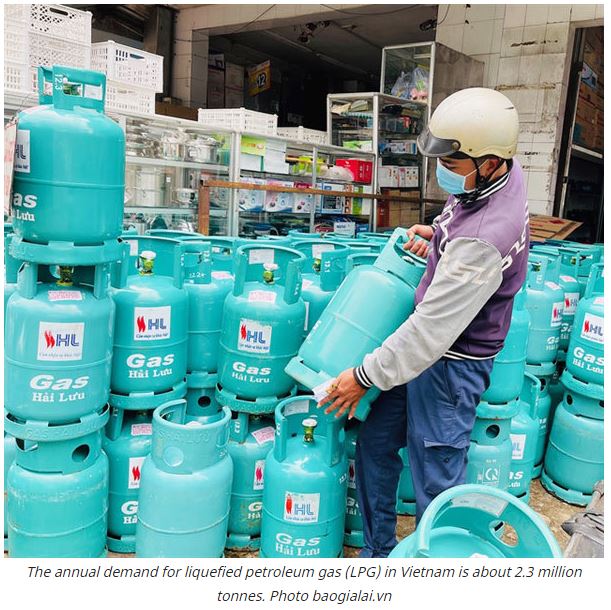Vietnam: Domestic gas market needs more specific regulations
The annual demand on liquefied petroleum gas (LPG) consumption in Vietnam has been about 2.3 million tonnes, mainly for civil and commercial consumption.
The Ministry of Industry and Trade’s Department of Petroleum and Coal has reported that the domestic gas output is about 9-10 billion cubic metres per year, of which 85 per cent is for power plants, 11 per cent for fertiliser production factories, and 4 per cent for other consumers.
The annual demand on liquefied petroleum gas (LPG) consumption in Vietnam has been about 2.3 million tonnes, mainly for civil and commercial consumption.
According to the Vietnam Gas Association, a system of regulations on gas trading has been established to regulate entities joining the domestic gas trading market and help State management agencies manage the market.
However, the association said this market has had a lack of cooperation in business, unfair competition and violations in trading activities. These include appropriation of LPG (liquefied gas) cylinders, illegal filling of gas and violation on trademark regulations. In addition, some gas traders have not made business registrations or not met conditions for trading gas under existing regulations.
According to the association’s Vice Chairman Tran Minh Loan, those results are due to not completing the legal system on gas trading activities.
Nguyen Thi Hanh, a representative of Totalgaz Vietnam Co said: “At present, each locality has applied administrative sanctions for the violator based on different legal regulations, causing many difficulties for enterprises.”
Hoang Anh Tuan, deputy director of the Department of Domestic Market, also said there were not full and specific regulations for the gas distribution system, causing difficulties for regulators and businesses in the implementation of the regulations.
In addition, there are also no specific regulations on exchange of gas cylinders for enterprises trading LPG cylinders and LPG cylinder filling stations, making it difficult to control gas trading activities.
There still are difficulties in implementing regulations to stop appropriation of such cylinders on the market.
Do Thang Hai, deputy minister of Industry and Trade, said the Prime Minister had approved a project on developing a competitive energy market. Accordingly, the goal for the gas market is to build a legal framework as a basis for developing a competitive business model for compressed natural gas, LPG and liquefied natural gas.
At the same time, a legal framework relating to the right of rent and use third-party infrastructure will be completed to develop the gas market in the 2021-2025 period, including financial regulations, and technical and commercial standards.
The system of legal documents on gas trading has been developed, Hai said, but a number of policies must be reviewed and adjusted to ensure feasibility.
Tran Minh Loan, vice chairman of the Vietnam Gas Association, said the State needs to continue completing the regulations on the management of LPG trading activities and sanctions for violations. At the same time, the State must strengthen inspection and strictly handle violations.
“During completing the regulations, the State management agencies should discuss with the association and enterprises to remove difficulties and obstacles of enterprises and make regulations suitable with production and business activities,” said Loan.
Hanh, the Totalgaz Vietnam representative, said that there should be consistency in regulations on dealing with violations in the gas business, including anti-counterfeiting stamps, product packaging, illegal filling and trading of counterfeit goods.
“The State needs to increase value of fines, add articles on fines for gas extraction stations and handle strictly violations in gas trading. If the violations are repeated, that company shall bear the criminal responsibility for the infringement upon industrial property rights,” Hanh said.
Source: Vietnam News


 English
English




